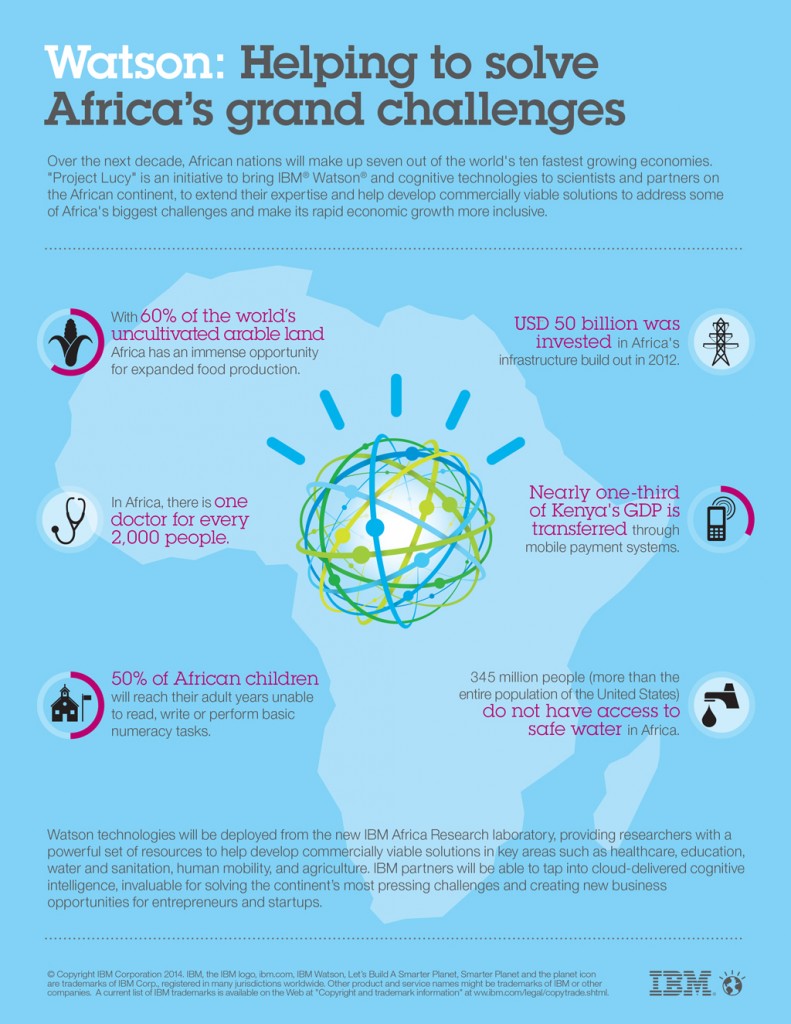February 12, 2014 – Named after the fossil human ancestor Lucy discovered in Ethiopia a few decades ago, IBM is taking on Africa’s greatest challenges using Watson, the computer the company created to beat all challengers at the game, Jeopardy.
Watson’s artificial intelligence gives it the skill to discern patterns in complex data. Applying this ability to the many challenges Africa is experiencing from freshwater shortages to mass rural to urban migration will prove a useful tool for cross country planning initiatives.
IBM will partner with the pan-African Center of Excellence for Data-Driven Development that includes universities, development agencies, NGOs and business start-right across the continent.
Here are some interesting facts that Africa will have to deal with in the coming decades:
- Africa’s population is expected to increase by 1.8 billion to 2.4 billion in the next 50 years with 25% of the world’s population residing on the continent. In this projection 37 countries will double their population by 2050.
- Africa has the highest urban growth rate in the world with Lagos, Nigeria becoming the world’s third most populous within the decade exceeding 25 million.
- In 2050, 50% of Africa’s population will be under the age of 24, and by 2100 almost half of the world’s youth population will come from this continent. Of these 1/3 in sub-Saharan Africa lack basic skills to meet the 21st century labour market even though they will represent a larger workforce than all of China.
- To date Africa has developed only 5% of its hydroelectric capacity. This untapped resource could provide electricity to almost all of the continent where today only 25% of sub-Saharan citizens have access to power.
- At the same time Africa is increasingly facing freshwater shortages and must address this challenge with a multitude of potential solutions from new irrigation technologies to the introduction of drought-tolerant cultivables.
- Today Africa has the lowest yield rate of any continent in producing food crops despite containing 60% of the remaining uncultivated arable land on the planet. The opportunity to become self-sustaining in food production is there.
- Africa has the fastest growing mobile telecommunications buildout on the planet. In Kenya alone almost 1/3 of the commerce in the country gets transferred through mobile payment systems. This illustrates how Africa is capable of leapfrogging legacy technology infrastructure to achieve 21st century outcomes.
IBM will invest $100 million U.S. over a decade to help Africans find solutions using the Watson cognitive computing platform. This is technology that has the ability to sift through large amounts of data and find emerging patterns and correlations. With Watson seeking answers to Africa’s challenges the continent could find itself emerging as a strong economic player in the global community rather than the “sick man” of the planet.
So what started as a project to build a computer to beat the best human contestants in a television game show is turning into a world beater of a technology.















Your poignant photo of the four humans, donkey, and makeshift cart, plodding through the dust storm in a hostile desert pretty much says it all about the nature of Africa’s problems. We don’t need Lucy to understand it, and Lucy can offer no significant solutions. If IBM wants to help African civilization with $100,000,000, it needs to invest in bleach plants and cheap Chinese diesel generators, PVC pipe, and 120-foot water-wells.
I recently watched a Michael Palin Sahara Desert travel special where he went to Timbuktu. The ancient remote city is on the upper Niger River in the Mali desert. Michael accompanied a camel caravan along with six Tuaregs trekking several hundred miles across the desert to pick up a couple thousand pounds of nasty evaporation basin salt to return back to Timbuktu. Total net profit after fourteen days of desert depreciation on ten camels, and about 1,000 subsistence Tuareg man-hours, must have amounted to less than $100. That works out to about $0.60 per day per man. Do we need Lucy to notify the residents of Timbuktu that clean granulated salt is available from the Morton Salt Co. for about 3-cents/pound through global commerce at the Senegal seaport of Dakar, from which rail connections extend to Bamaku on the Niger River. Barges can cheaply float a salt cargo down river to Timbuktu. Obviously a single Tuareg camel puller could invest only a few man-hours and contract to have fresh clean salt delivered to Timbuktu by barge for less than ten cents/pound. So then the question would be, once Timbuktu’s salt requirements are satisfied through rational means, what are we going to do with the ten camels and five unemployed Tuareg camel plodders?
There are many problems we can readily identify in Africa that don’t require big data analysis to figure out what to do. But beyond the public relations value of IBM’s Lucy Project, I believe some new insights and solutions for Africa’s challenges may come from unusual correlations that come out of the data analysis.
And Africa’s problems cannot be addressed in isolation. So the data the Lucy Project needs to assess goes beyond the boundaries of the continent. It will be interesting to see where this all gets us in two, three or five years.
[…] IBM's Watson will spend the next decade analyzing the challenges Africa faces and helping the continent to find solutions. […]